Seven Chesapeake farmers who make conservation a priority
Sustainable farming reduces runoff to the Bay and creates habitat for wildlife
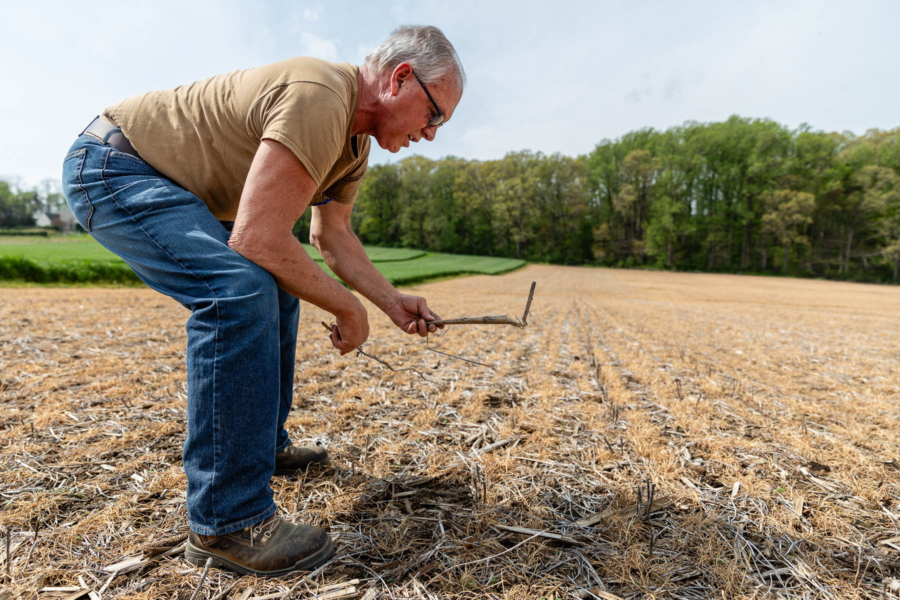
Agriculture is one of the largest sources of nutrient and sediment pollution to the Chesapeake Bay, but it’s also where a lot of progress is being made. Each year, a growing number of farmers adopt sustainable practices like cover crops, rotational grazing and no-till farming—methods that reduce nutrient and sediment runoff into waterways. In return, farmers see benefits such as healthier livestock, improved soil quality and increased wildlife habitat. The following spotlights a few that demonstrate prioritizing sustainability doesn’t mean sacrificing profitability.
Bobby Whitescarver and Jeanne Hoffman, Whiskey Creek Regenerative Farm
Farmers and conservationists can sometimes be at odds with each other, but other times, they get married. That’s what happened with Jeanne Trimble Hoffman, a ninth generation beef cattle farmer in Virginia, and Bobby Whitescarver, an educator and soil and water conservationist. The two have been married for over 20 years and now manage two farms where sustainability is top of mind. The couple fenced the cows out of their farm in Swoope, Virginia and planted trees along the Middle River, which runs through the property. At Whiskey Creek Regenerative Farm in Churchville, Virginia, the couple has planted forest buffers while practicing no-till, cover cropping and rotational grazing. Their approach to farming has helped inspire and educate several other farmers in the region.
MK and Andrew, Open Book Farm
At the heart of Open Book Farm in Middletown, Maryland, is a desire to provide healthy and delicious food to their community. For owners MK and Andrew, this means using less chemical fertilizers and pesticides, and relying on organic methods like rotational grazing where their steers, pigs, chickens and turkeys fertilize the pasture naturally with their own manure. Beyond rotational grazing, the couple has planted streamside trees and uses cover crops, which helps to keep soil in place and limit the amount of nutrient pollutants running into nearby streams.
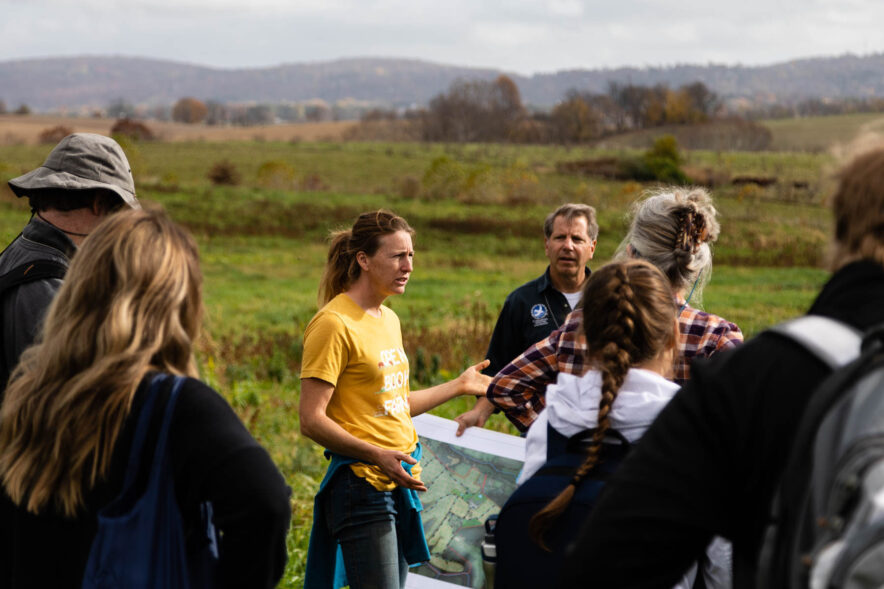
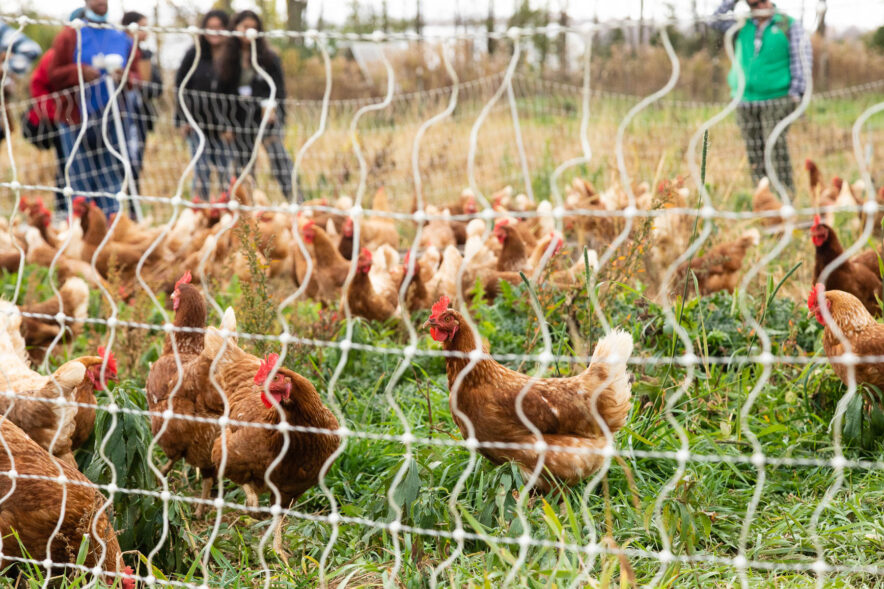
Kathleen O’Keefe, Up Top Acres
As the co-founder of Up Top Acres in Washington, D.C., a nonprofit that installs garden and urban farms on top of city rooftops, Kathleen O’Keefe is certainly a non-traditional farmer. She works with building owners to design innovative rooftop gardens and farms, while providing the labor to grow and harvest the produce. The motivation behind the organization is to reduce food insecurity, but the produce is also grown using organic methods and adds insect and pollinator habitat to spaces that would otherwise have none. Up Top Acres currently manages over 40 farms and gardens across the East Coast and donates thousands of pounds of produce annually.
Becca and Bill, Bottomland Farm
In 2016, Becca and Bill opened up Bottomland Farm in Tioga County, New York with the goal of working in conjunction with nature, rather than suppressing it. The farmers inherited a corn and soybean farm with little biodiversity, and transformed it into a grazing pasture with a mix of native grasses and plants. During this process, Becca and Bill also worked with local partners to restore and enhance wetlands on the property and plant new trees along a stream adjacent to their pastures. The pasture, wetlands and forest attract wildlife that benefit the farm, like birds that eat pests or plants and insects that enhance the soil quality. In 2024, Bottomland Farm was presented with a 2024 Agricultural Environmental Management (AEM) Award for their sustainable work.
Roger Rohrer, Lancaster family farm
Roger Rohrer was an early adopter of the U.S. Department of Agriculture’s Conservation Reserve Enhancement Program (CREP), which pays landowners to reserve parts of their farm for trees and other vegetation instead of crops or animal pasture. Farmers like Rohrer were a testing ground for CREP and helped the program evolve to be more effective. Roher’s farm in Lancaster, Pennsylvania now has decades-old forest buffers protecting a nearby stream and acres of switchgrass that are used as habitat for wildlife. His sons mostly run the farm today, and they continue to enroll parts of the farm in CREP and practice no-till.
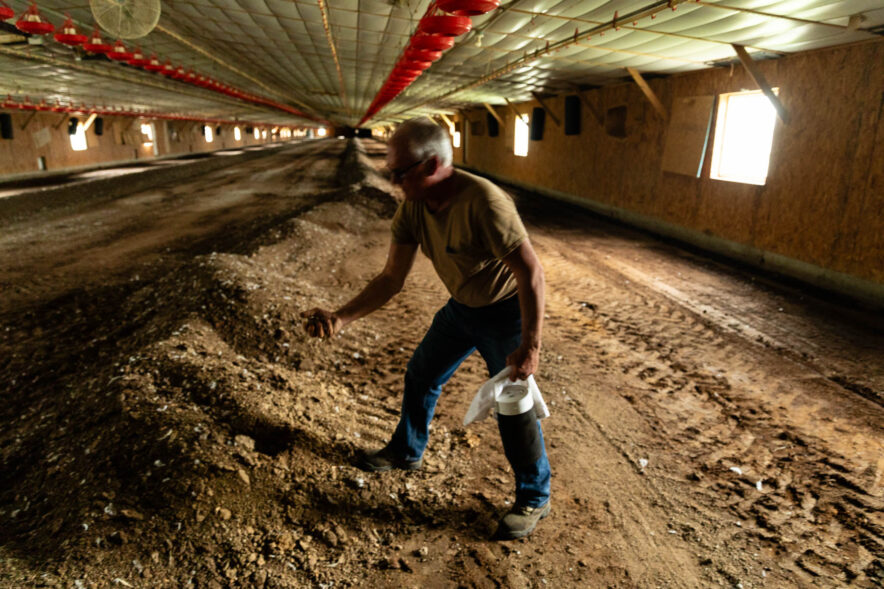
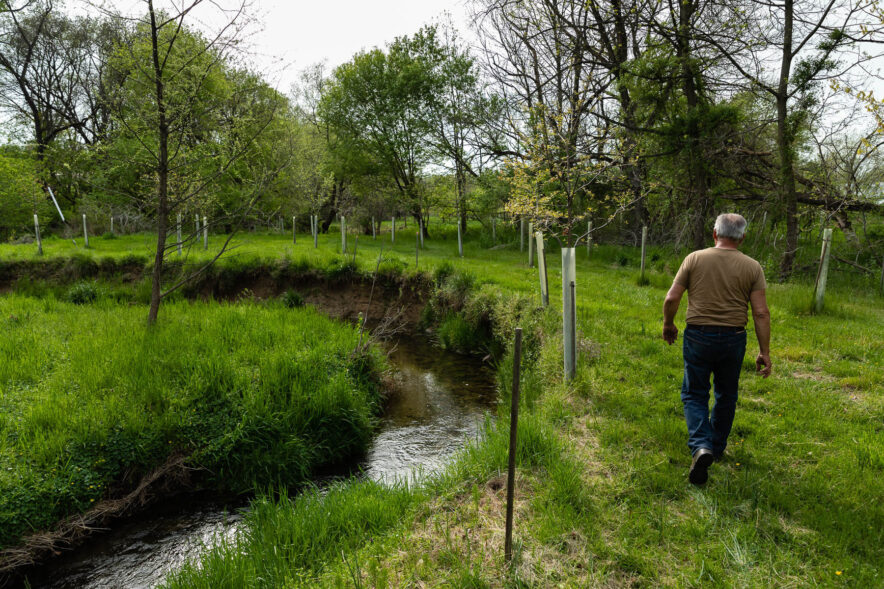
Hope and Bev Yankey, Wilding Woolly Farm
Hope and Bev Yankey are on a mission to “rewild” much of their farm in Mathias, West Virginia for the betterment of nearby trout streams. With the help of Trout Unlimited, the Yankeys fenced off 23 acres of land so that their livestock wouldn’t graze there, and then planted over 1,000 native tree seedlings. This field of trees will act as a buffer that keeps nearby streams healthy and provide shading needed for cool water fish such as brook trout. Hope and Bev are also working with the U.S. Fish and Wildlife Service to protect wood turtle habitat on the property.
Richard Swartzentruber, Swartzentruber Homestead
Richard Swartzentruber is a fourth-generation farmer who refuses to use synthetic fertilizers or pesticides on his property near Sussex, Delaware, which can endanger wildlife and pollute local waterways. Instead, he uses organic methods to strengthen the soil like grazing cattle on cover crops, or removing weeds using a weed zapper attached to his tractor. His operation covers almost 200 acres of cropland, with 60,000 broiler chickens and 50 Wye Angus beef cattle that are certified organic. In 2024, Swartzentruber received a Governor’s Agricultural and Urban Conservation Award.
Do you or someone you know own a farm that is committed to sustainability? Let us know in the comments!

Comments
There are no comments.
Thank you!
Your comment has been received. Before it can be published, the comment will be reviewed by our team to ensure it adheres with our rules of engagement.
Back to recent stories